Sunflower is the most important oilseed crop grown in temperate countries. It is the largest source of vegetable oil in the world. Nitrogen is very important when it comes to the fertilization of Sunflowers. All plants need nutrients to grow. Whenever there is an excess or deficiency of nutrients, plants begin to struggle. Of the many nutrients needed, nitrogen is probably the most important. Let’s check out the best fertilizer for Sunflower crop
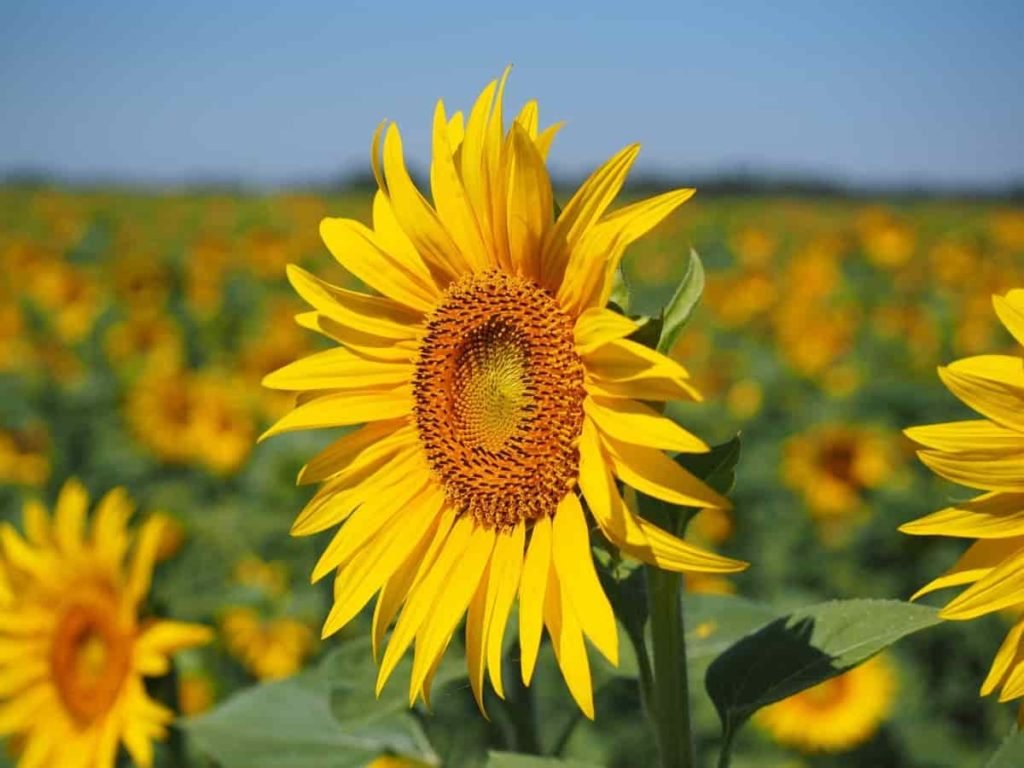
Sunflowers are very taxing on soil nutrients. Due to the high demand for nutrients in spring, fertilizer should be applied to the soil before sowing. Proper soil fertility is one of the requirements for profitable Sunflower production. If your Sunflower is having a hard time, it’s time to check for nutritional imbalances. Once you have identified the problem, you will need to correct it by providing an all-inclusive fertilizer that includes both macro and micronutrients.
Types of fertilizers
Common fertilizers containing nitrogen, phosphorus, and potassium will work well for fertilizing Sunflowers. Granular fertilizer is ideal in the spring because of the gradual release of nutrients over time. Apply a small amount of granular fertilizer to the soil before planting, if the soil is not rich in nutrients. As the Sunflower matures, water-soluble fertilizer can be used. An organic route can be followed, and the soil can be fertilized with manure and other chemical alternatives.
It is important to remember that when you use artificial fertilizers, you first feed a very complex mixture of soil bacteria, fungi, and other organisms found in healthy soil. It then converts all of these nutrients into available plant nutrients that can be enabled by root germination, plant growth, flowering, and finally seed production. If you can create humus in the soil, your soil will be able to contain more plant nutrients that may be available to your Sunflower at the seed head and flowering stages.
In case you miss this: Organic Sunflower Production - Cultivation, Farming
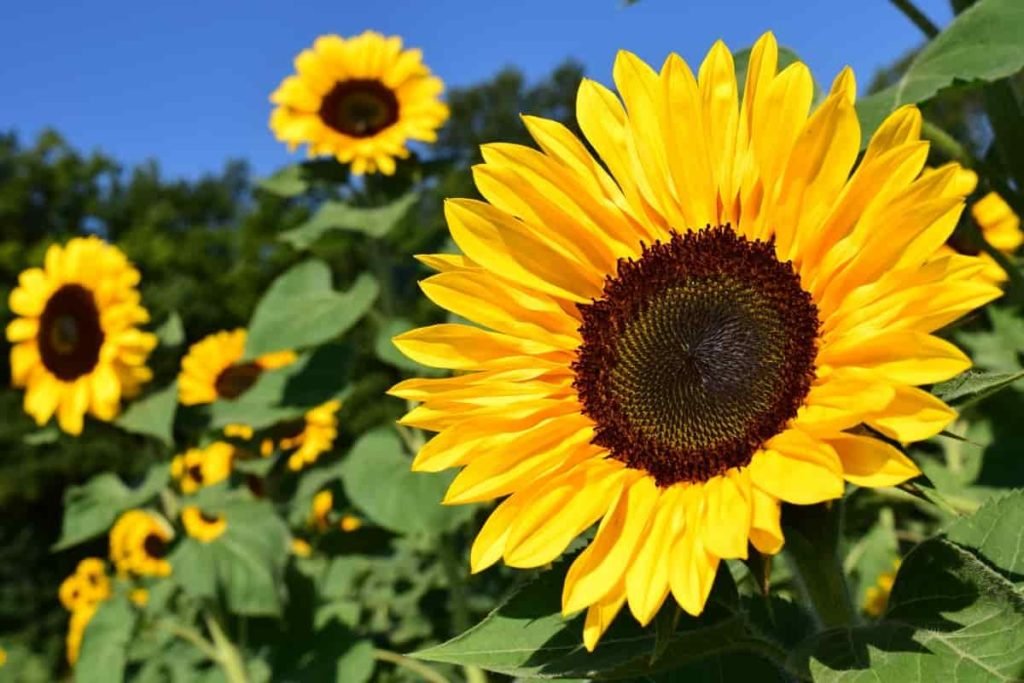
Application of fertilizers
- Before the last plowing, apply 12.5 tons per hectare of FYM or compost or composted coir pith evenly in the field and mix it with soil by plowing.
- Apply NPK fertilizers mainly as per soil testing recommendations.
- Bio-fertilizers – Before sowing, apply soil application by mixing 10 packs (2000 g / ha) of phosphobacteria or 20 packs of Azophos (4000 g / ha) and 10 packs (2000 g / ha) of Azospirillum with 25 kg FYM and 25 kg of soil.
Tips feeding for your Sunflowers
Feed and water your Sunflowers regularly, as they need a lot of nutrients to help them grow to their full potential. When the plants are small, water their roots about 10 cm away from the plants. Use about 10 liters of dilute liquid fertilizer solution every week. Iron, boron, manganese, copper, and molybdenum are important nutrients in micronutrients that affect the physiological aspects of plants. Sunflowers are also considered to be susceptible to boron deficiency.
As your Sunflower grows, make a small ditch around each plant, about 45 cm away from each plant and 10 cm deep. Feed your Sunflower about 20 liters of thin liquid fertilizer per week. Make sure you don’t put fertilizer on the plant stems, otherwise they will rot. Once your plant starts to bloom, feed it with high potash tomato feed.
For Sunflower growth, it is a good idea to apply some slow-acting granular fertilizer, especially in poor, thin soils. The better their diet, the bigger the flowers. Do not add too much nitrogen as it will delay flowering. Spreading a 2- or 3-inch mulch layer of organic matter on the ground will reduce moisture loss through evaporation and discourage weeds.
In case you miss this: Sunflower Seed Germination, Time, Temperature, Process
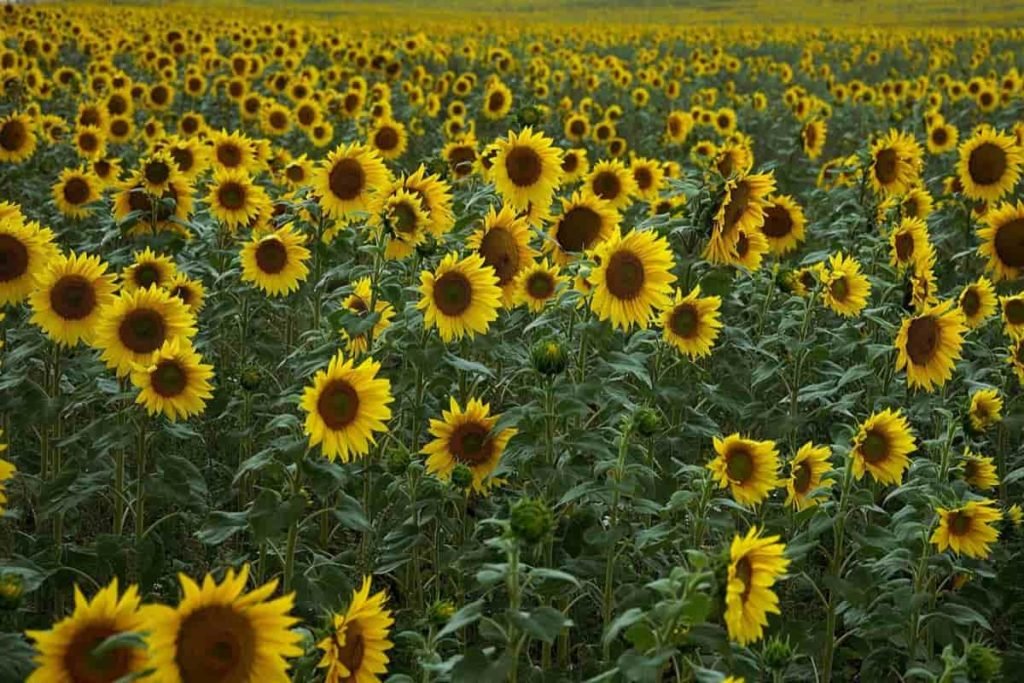
Avoid over-fertilizing - Be careful when applying fertilizer. Excessive fertilization must be stopped. The leaves will burn, and too much fertilizer can kill the plant. The soil test is very useful to know before applying fertilizer.
Should I fertilize Sunflowers?
The decision of when and how to start feeding Sunflower plants will largely depend on the condition. If Sunflower is grown commercially, these plants will need a lot of nutrients. Sunflowers are known to be extremely heavy feeders during the growing season. Although it is possible to grow Sunflower plants without feeding them, the soil must have nitrogen, phosphorus, potassium, and a wide range of nutrients for best results.
When is the best time to fertilize Sunflowers?
Sunflowers need to be fertilized at the beginning of summer, when the new plant begins to grow, or at the end of mid-summer when the plant begins to bloom. When you fertilize Sunflowers in early summer, you are mostly focusing on the leaves and green growth of the plant. As summer comes to a close, you need to work on fertilizing Sunflower plants with something that encourages them to bloom more Sunflowers.
Sunflowers are hardy plants. They will grow anywhere with very little care. If you are lucky enough to own some land, it is best to plant the seeds directly in the soil. If you are using containers for growing, however, make sure you use a pot-making mix that is loose and easy to remove. Potting mixtures play an important role in plant growth. And later, instead of trying to solve the problem, it makes sense to use something of the plant’s choice when planting.
To make a good potting mix, use cocoa coir, compost, worm casting, worm compost, and perlite. Mix them all up. A large amount of bone meal will be amazing for Sunflowers as they produce a lot of flowers. Adding sand to your pot mix will also help improve drainage. Whatever you do, just make sure the plants don’t sit in soil that retains too much water. Eventually, this will lead to root rot. If you can’t make your potting mix, buy one online or from your local nursery.
Epsom contains insect casting and compost, so you can try it. Or, you can buy everything separately and add it yourself. If the soil has a good mix of nutrients, there is no need to fertilize during the growing season. If you find that the plant is struggling, however, you can add NPK fertilizer or any organic matter to help the plant.
Adding a lot of fertilizer will work well. Unlike commercial fertilizers that use more harm than good, fertilizer will not be a problem. You can also try chicken manure when planting seeds. It is very beneficial to apply cow and horse manure before flowering. Use well-rotted manure as fresh manure can cause problems.
In case you miss this: Sunflower Cultivation Income, Yield, Project report
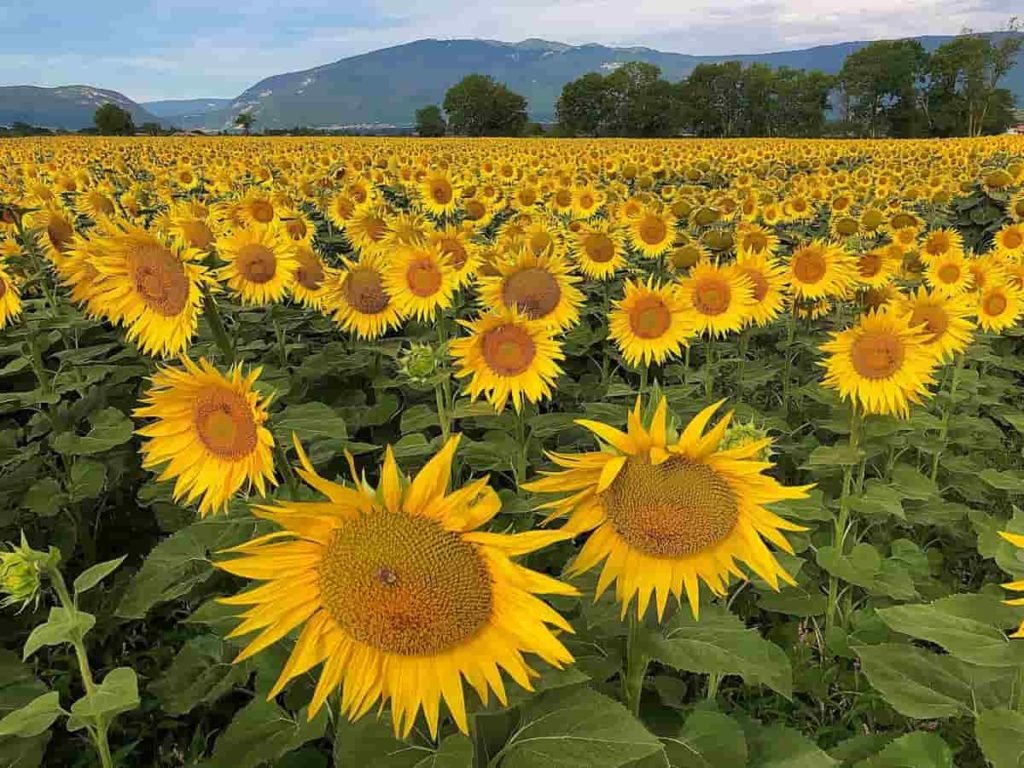
Fertilizer application options for Sunflower
When applying 20-30 tons of fertilizer per hectare in the field, we can expect an increase in yield of 0.2-0.5 tons per hectare. Fertilization using No-Till technology gives good results in the first years of use. 1.2-1.5 kg of Sunflower seeds can be expected from 1 kg of fertilizer. Manure, phosphate, and potash fertilizers are recommended for autumn cultivation.
Nitrogen is used under pre-sowing cultivation. As an option, it is possible to add complete fertilizer to a depth of 12–14 cm in the spring. Or, apply superphosphate (or complex fertilizer) in a row during sowing. If there is sufficient moisture, it is possible to feed 2-3 pairs of phosphorus and potassium in the leaf stage without basic use in the fields.
In the Sunflower crop, foliar feeding is rarely used to make nitrogen, phosphorus, or trace elements. In case of the slow growth of plants in winter use nitrogen fertilizer. At the beginning of the growing season, phosphorus is used to accelerate the growth of the root system. When growing Sunflowers in the same field for more than 2 consecutive years, it is necessary to make mineral fertilizer.
Best fertilizer for Sunflower crop growth
Nitrogen
Nitrogen promotes plant growth, helping to form large baskets. But in the Sunflower crop, excess nitrogen leads to excessive formation of vegetative mass, improper use of fluid, which leads to its deficiency during critical periods (flower & seed formation). The best option would be an increase between the moderate nitrogen nutrients and the emergence and flowering stages before the appearance of the baskets. With nitrogen deficiency, the number of seeds in the basket decreases. Sunflower responds to 30-80 kg N / ha depending on soil moisture condition.
Phosphorus
Phosphorus contributes to the development of the root system (as with other grains), the reproductive organs, is responsible for the number of flowers in the basket. With the maximum amount of phosphorus, plant growth and development faster, more rational use of moisture is made, and more oil accumulates in the seeds.
In case you miss this: Sunflower Oil Extraction Process, Methods - A Full Guide
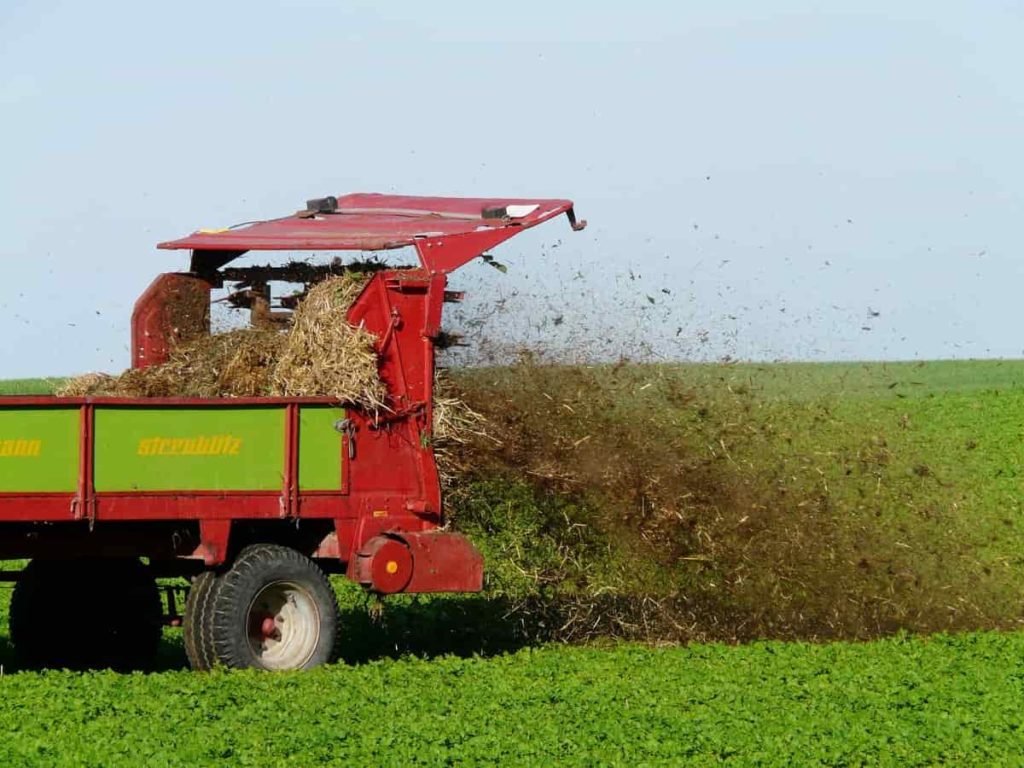
Potassium
Sunflower is a very active user of potassium - it takes 100-150 kg per hectare to produce 1 ton of seed. In general, thanks to a powerful root system, Sunflowers freely extract all the necessary potassium from the soil. Therefore, it is necessary to make this mineral only if its content in the soil is low.
Sulfur
An adequate amount of sulfur improves nitrogen metabolism, increases production and oil content in seeds. With a sulfur deficiency, the leaves become light green (yellow) in color, spotted chlorosis is noted, and the overall growth of the plant slows down.
Boron
Firstly, you need to consider boron - Sunflower is very sensitive to the deficiency of this element. Boron is responsible for pollen growth, pollination, increase in the number of seeds in the basket, increase in total crop yield.
Manganese
Plants need manganese to get normal nitrogen through phosphorus, it is also necessary for protein metabolism. The recommended dose is 50-80 kg per hectare in soil or sheet feeding, where the dose is less.
NPK fertilizer schedule
Sunflower is a crop that needs more fertilizer. From the formation of the disk to the flowering stage, this is the peak of Sunflower fertilizer requirement. From emergence to the formation of the disc, more phosphorus is required, from the formation of the disc to the end of the flower, more nitrogen is required, and from the formation of the potassium disc to the maturation of the wax. Therefore, Sunflowers are fertilized with phosphorus in the early stages and nitrogen and potassium in the middle and late stages.
Phosphorus and potassium fertilizers are mostly used as basic fertilizer or seed fertilizer, while nitrogen fertilizer is used as top fertilizer or 1/3 as basic fertilizer, and 2/3 as top fertilizer. The crop performs best when organic and inorganic fertilizers are applied. Fertilizer Nitrogen: Phosphorus: Potash (NPK) is recommended for rainfed and irrigated crops at 20:30:20 and 40:60:40 kg (NPK) per hectare, respectively.
In case you miss this: Sunflower Farming; Planting, Harvesting - A Full Guide
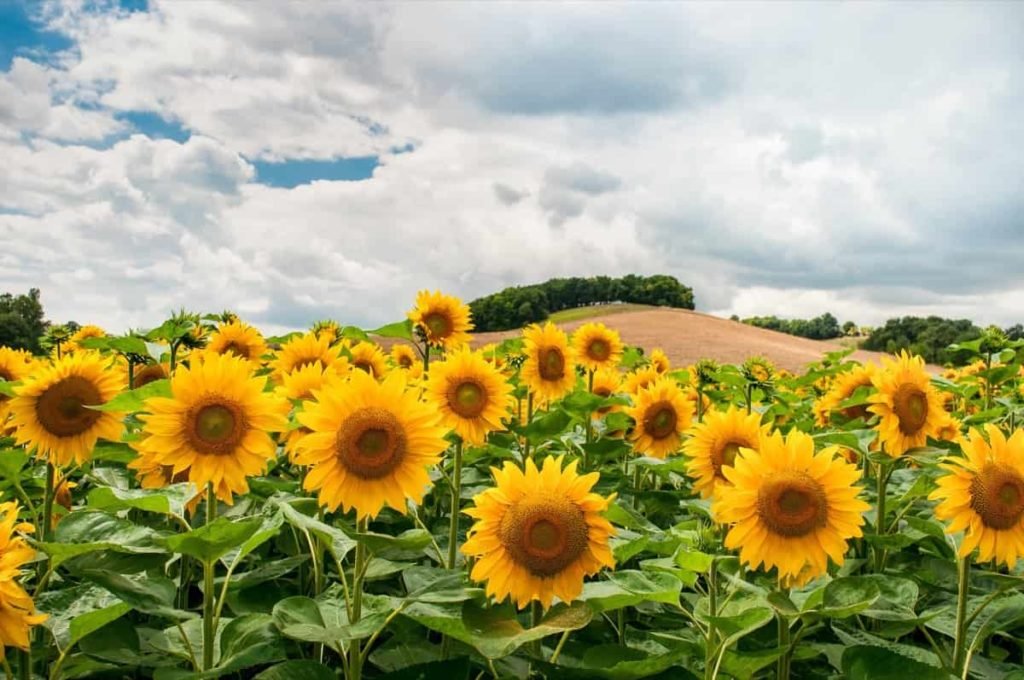
Organic fertilizers
- Blood meal
- Chicken manure compost
- Fish emulsion fertilizer
- Horse manure compost
- Seaweed fertilizer
- Compost tea
- Bone meal
- Mushroom compost fertilizer
- Cow manure
- Best Fertilizer for Sunflower Crop: Organic, NPK, Compost Manure, and Schedule
- An Indigenous basket-weaving tradition keeps a Philippine forest alive
- New Science Is Backing Your Windowsill Microgreen Endeavors
- On test: Ford’s all-wheel-drive Transit Trail van
- Publisher’s Platform: Infant Formula Cronobacter and Salmonella Outbreak: I still have questions
- Public food complaints in Ireland up in 2021
- Top Agricultural Colleges in Uttarakhand: Government and Private
- Best Fertilizer for Sugarcane: Organic, Biofertilizers, NPK, Compost Manure, and Schedule
- Best Fertilizer for Sugarcane: Organic, Biofertilziers, and NPK
- How to Get Hydroponic Farming Subsidy: Up to 50%, and License to Start
- What the War in Ukraine Means for US Agriculture
- New taskforce to tackle rural crime in Thames Valley
- Business Clinic: How do we manage daughter’s farming ideas?
- FW Inventions Comp 2022: Ollie Mackintosh’s inter-row drill
- Opinion: Animal welfare reflects a business’s culture
- Questions loom as FDA remains quiet on investigation into infant formula outbreak
- Imported chicken linked to Campylobacter cases in Estonia
- Homemaker Turns Barren Land Into Award-Winning Lush Organic Farm, Earns Rs 18 Lakh
- Government test shows listeria contamination in jerky; recall initiated
- As rising seas destroy Ghana’s coastal communities, researchers warn against a seawall-only solution
- March 17 webinar on military-related traumatic brain injuries AgriLife Today
- El Salvador declares rare ‘red alert’ amid surge in forest fires
- Dollar Tree recalls all Family Dollar products because of rodent infestation
- Some of Walmart’s Great Value tortilla chips recalled because of metal pieces
- Bird Flu is Rapidly Spreading Through US Poultry Flocks
- Congresswoman demands answers about investigation of infant formula outbreak
- Ag on Instagram: The best farm photos from March 4, 2022
- Ag Safety Awareness Program Week takes place March 7-11
- District Wise Crop Production in Gujarat: Major Crops in Gujarat
- Seven of the world’s best cheeses hail from Wisconsin
- Analysis: What are the Benefits of Precision Fermentation?
- Dairy groups slam Canadian proposal on USMCA Dairy Market Access
- Half-hearted prosecution lets ivory traffickers escape in Uganda
- Hydroponic Leafy Greens DWC Floating Raft System Components – Urban Ag News
- Wheat prices smash record highs
- New Ground — Episode 21: Animal activism, Ukraine, beef
Source link











